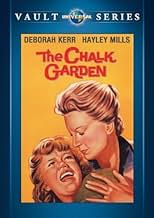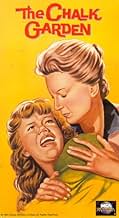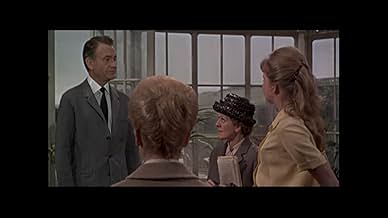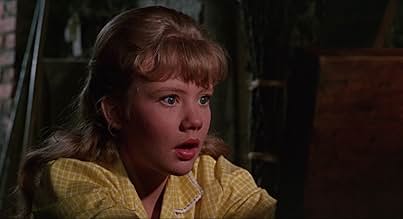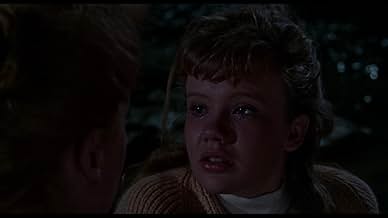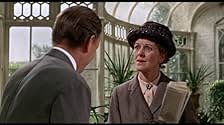Une femme âgée engage une gouvernante au passé mystérieux pour s'occuper de sa petite-fille adolescente dérangée et gâtée, qui finit par comprendre le sens du sacrifice de soi, comme exemple... Tout lireUne femme âgée engage une gouvernante au passé mystérieux pour s'occuper de sa petite-fille adolescente dérangée et gâtée, qui finit par comprendre le sens du sacrifice de soi, comme exemple d'amour et devient une meilleure personne.Une femme âgée engage une gouvernante au passé mystérieux pour s'occuper de sa petite-fille adolescente dérangée et gâtée, qui finit par comprendre le sens du sacrifice de soi, comme exemple d'amour et devient une meilleure personne.
- Nommé pour 1 oscar
- 3 victoires et 6 nominations au total
Histoire
Le saviez-vous
- AnecdotesGladys Cooper was originally named to play the role of Mrs. St. Maugham (which was eventually played by Dame Edith Evans). Evans, who had originally played the role on stage, very much wanted the movie role and had director Ronald Neame take her to meet producer Ross Hunter at Claridges Hotel. As Evans won the producer over, she got the part.
- GaffesThe wall clock in the kitchen where Laurel, Miss Madrigal, and Maitland discuss the judge's visit changes from 9:30 to 6:30 between shots.
- Citations
[last lines]
Mrs. St. Maugham: [on the verge of tears] Is it a crime to want to be remembered?
Miss Madrigal: No. The Pharaohs built the pyramids for that reason.
Mrs. St. Maugham: What do women do in my case?
Miss Madrigal: It wouldn't hurt to go on gardening.
Mrs. St. Maugham: Have I've a muddle of my garden... and my heart? Will Olivia forgive me?
Miss Madrigal: In time, perhaps.
Mrs. St. Maugham: Would you stay with me? Would you?
Miss Madrigal: I'll stay... as long as I'm wanted. You know, we could make this place so full of life - a good life - and people would come from everywhere to see us. What do you think?
Mrs. St. Maugham: I must know one thing.
Miss Madrigal: What's that?
Mrs. St. Maugham: Did you do it?
Miss Madrigal: What many learned men at the top of their profession couldn't find out after a long, long trial. Why should you know.
Mrs. St. Maugham: Forty years ago, I should have said the same thing, but I warn you, before I die, I'll find out.
[the two walk off together]
- ConnexionsReferenced in What's My Line?: Louis Armstrong (2) (1964)
The story is set in an old manor house in Sussex. (The house used is a real one, in the village of East Dean on the South Downs near Eastbourne). A mysterious woman calling herself Miss Madrigal arrives at the house to be interviewed for the position of governess to Laurel, the teenage granddaughter of the owner, Mrs. St Maugham. Although Miss Madrigal has no references and no previous experience as a governess, she gets the position, largely because Laurel is such a badly-behaved child that none of the other candidates can bear the thought of looking after her.
This is, however, no comedy about an amusingly naughty girl. It soon becomes clear that Laurel's behaviour is far more than childish mischief or teenage rebellion, and that she is in fact a deeply unhappy and disturbed young woman. She seems to be preoccupied with crime, especially murder and arson, and the roots of her unhappiness appear to lie in her upbringing. Her father is dead and her mother abandoned her when she married for a second time, leaving the girl to be brought up by her imperious and eccentric grandmother, who has neglected her. Laurel's mother Olivia, however, has now reappeared and is intent on reclaiming custody of her daughter, a prospect Mrs. St Maugham views with abhorrence as she regards Olivia as an unfit mother.
The title "The Chalk Garden" refers on a literal level to the alkaline chalky soil in Mrs. St Maugham's garden, an unsuitable medium for growing the sort of flowers which the old lady is trying to plant, especially rhododendrons which need acid soil. (In other parts of Sussex they grow like weeds). Metaphorically, it is used to suggest that Laurel, symbolically named after a plant, has also been raised in the wrong type of environment.
The film was directed by Ronald Neame who was also responsible for "The Prime of Miss Jean Brodie". In both films he makes symbolic use of colour. Here the predominant colours are green (representing the "garden" element of the title) and white (representing "chalk"). The green of the vegetation predominates in the outdoor scenes, white in the indoor ones, and many scenes feature a prominent white object- a nightdress, a glass of milk, the cliffs of Beachy Head or the Seven Sisters. Symbolically, green can be seen as symbolising youth and growth, white with innocence but also with aridity and sterility. Other colours are associated with particular characters who are often seen dressed in them- yellow with Laurel, blue with Miss Madrigal, purple (the colour of both royalty and mourning) with Mrs. St Maugham, who is both imperious and unhappy. The bright reds, pinks and oranges which played an important part in "Jean Brodie" are not much used.
As in "Jean Brodie", Neame elicits some fine performances from his stars, especially the women. (In both films the female roles are more prominent than the male ones). Apart from three silent movies in the 1910s, Edith Evans was an actress who came late to the cinema, not making her first "talkie" until she was in her sixties, but quickly carved out a niche playing haughty upper-class ladies, most famously Lady Bracknell in "The Importance of Being Earnest". Here, as Mrs St Maugham, she shows that she could play this sort of role in serious drama as well as comedy. Deborah Kerr, as Madrigal, is suitably mysterious and inscrutable in the early scenes, more passionate in the later ones after the secret of her past (I won't say what it is) has been revealed. There is also a good contribution from Hayley's father John as the butler Maitland (who may also hide a secret of his own). John Mills also acted with his daughter in three other films, including "Tiger Bay".
Hayley Mills is brilliant as the disturbed, unhappy Laurel, one of her best roles and a more challenging one even than Gillie in "Tiger Bay" or Cathy in "Whistle Down the Wind". Seeing this film made me all the more surprised that she did not go on to become a bigger star as an adult. This is one of a number of films in which Hayley plays a child or teenager growing up in something other than the traditional two-parent family- in "Whistle Down the Wind" she is being raised by her widowed father, in "Tiger Bay" and "Pollyanna" she is an orphan and in "The Parent Trap" she plays twin sisters whose parents are divorced.
I would not rate this film quite as highly as "Tiger Bay", "Whistle Down the Wind", or "Jean Brodie", three of the classics of the British cinema. The plot, based upon a play by Enid Bagnold, can seem a bit too neat and schematic when the secret of the mysterious Miss Madrigal's own past is finally revealed, and there is some rather trite moralising. Nevertheless, it is a well-acted and well-photographed piece of film-making, and I am surprised that it is not better known. 7/10
- JamesHitchcock
- 4 avr. 2012
- Lien permanent
Meilleurs choix
- How long is The Chalk Garden?Propulsé par Alexa
Détails
- Date de sortie
- Pays d’origine
- Langue
- Aussi connu sous le nom de
- The Chalk Garden
- Lieux de tournage
- Clapham House, Clapham Lane, Litlington, East Sussex, Royaume-Uni (RU)(House exteriors and garden)
- sociétés de production
- Consultez plus de crédits d'entreprise sur IMDbPro
- Durée1 heure 46 minutes
- Rapport de forme
- 1.85 : 1
Contribuer à cette page



